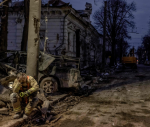You are here
A COVID genocide in the Americas?
Jan 24,2021 - Last updated at Jan 24,2021
By Federico Finchelstein and Jason Stanley
NEW YORK — Many commentators seeking to understand Donald Trump and Trumpism have found clarity in historically resonant concepts such as fascism. And yet, the most damning element of that historical parallel, the phenomenon of genocide, has yet to feature prominently in the US public discussion.
In this respect, the United States has lagged behind Brazil, where Gilmar Mendes, a judge on Brazil’s supreme federal court, warned last July that Brazilian President Jair Bolsonaro’s craven response to COVID-19 might make his government culpable in genocide against Indigenous people.
With the US COVID-19 death toll now having exceeded 400,000, it may be time for the American mainstream to acknowledge Trumpism’s own genocidal potential. As in Brazil, Indigenous communities in the US have suffered disproportionately from the pandemic, leading the scholar Nick Estes to compare the Trump administration’s response to the original genocide against Native Americans.
We share Estes’s concerns. The administration’s consistent prioritisation of political considerations over public health increased the risk to black and Indigenous communities in culpably foreseeable ways.
After all, we have known since last April that the virus was having a greater impact on African-American, Latinx and Indigenous communities. Yet since then, Trump and his fellow Republicans have openly encouraged anti-lockdown protests and questioned the need for protective measures as basic as face-mask mandates.
Owing to a reckless disregard for public health at the highest levels, the US and Brazil are the world leaders in cumulative COVID-19 deaths. This is no accident, considering that Bolsonaro has explicitly replicated Trump’s political strategy. Like fascist leaders of the past, both men deny any and all responsibility for the deaths their actions have caused. Both regularly distort reality and present themselves as redeemers of “the people.” Not surprisingly, Bolsonaro is among the few national leaders who have affirmed Trump’s lies about the US election being “stolen”.
Bolsonaro has also blithely dismissed the COVID-19 death toll, asking, “Who did I kill?” To be sure, genocide is notoriously difficult to define. The Convention on the Prevention and Punishment of the Crime of Genocide, adopted by the United Nations in 1948, focused narrowly on the targeting of racial and ethnic groups; to avoid a veto from the Soviet Union, political groups were excluded. But this expedient exception should not constrain one’s moral evaluation of a regime’s actions. When narrowly political decisions are the basis for policies that eventuate in mass death, a reckoning is in order.
Trumpism and Bolsonarismo sustain themselves through propaganda and political interference in independent institutions, including the US Centres for Disease Control. The result is an endless stream of lies and conspiracy theories that have undermined mechanisms for holding those in power accountable. This approach has already had catastrophic implications for minority populations. The question is whether these governments’ policies of disinformation and willful neglect can also be described as criminal.
For a historical parallel, consider the well-documented role that Stalinism played in the “Holodomor”, the wave of famines that swept Ukraine in 1932 and 1933, causing millions of deaths. In rendering a moral assessment of Stalin’s legacy, the question of whether this particular episode technically qualifies as genocide is largely beside the point. As the historian Timothy Snyder shows in Bloodlands, each of the policies that led to the mass deaths in Ukraine “may seem like an anodyne administrative policy, and each of them was certainly presented as such at the time”. Stalin, too, could have asked, “Who did I kill?”
Notwithstanding an initial period of confusion early in 2020, scientists and public-health experts have long known that face masks, restrictions on in-person gatherings, widespread testing and tracing, and increased public awareness can substantially mitigate the spread and effects of COVID-19. Rejecting these policies, both Trump and Bolsonaro instead touted miracle cures while promising that the virus would simply “disappear”.
Moreover, the Trump administration’s COVID-19 taskforce, led by the president’s son-in-law, Jared Kushner, abandoned the national response plan it had in the works during the first months of the pandemic. “Because the virus had hit blue states hardest,” an inside source told Vanity Fair, referring to jurisdictions controlled by Democrats, “a national plan was unnecessary, and would not make sense politically”.
Thus, by April, Trump had already begun to call for a nationwide reopening. As The Atlantic’s Adam Serwer contended at the time, the administration “did not consider the lives of the people dying worth the effort or money required to save them”. Policymakers knew the death toll was disproportionately higher among poor and minority communities, who were vulnerable not for any innate reason, but as a result of deep social and structural inequities. They did not act to minimise the loss of life.
The implication is not that the Trump administration consciously decided on a policy of neglect to target minority populations for elimination. If it had done that, the UN definition of genocide would indeed apply. But remember the Holodomor. If narrow political decisions were the driving force behind policies that jeopardised the health of the Ukrainian people, it is not unreasonable, morally, to compare those famines to a genocide.
The issue, then and now, concerns the extent to which political decisions are indeed central to the ultimate outcome. In the case of COVID-19, investigative reporting has already shown that the Trump administration’s initial inaction was guided by narcissistic political considerations and indifference toward the plight of political opponents. Even if the administration’s policy was born merely of a desire to manage public perception in the run-up to an election, that hardly excuses the resulting cost in human lives.
It is time to put the COVID-19 crisis in its proper historical context. Brazilians are already having this debate, and Americans will have to do the same when coming to terms with the Trump era and its lasting legacy. Until we have a full understanding of the Trump and Bolsonaro administrations’ actions during the pandemic, talk of complicity in genocide cannot be dismissed as inapplicable.
Federico Finchelstein, professor of History at the New School for Social Research and Eugene Lang College, is the author of “A Brief History of Fascist Lies”. Jason Stanley, professor of Philosophy at Yale University, is the author of “How Fascism Works: The Politics of Us and Them”. Copyright: Project Syndicate, 2021.













